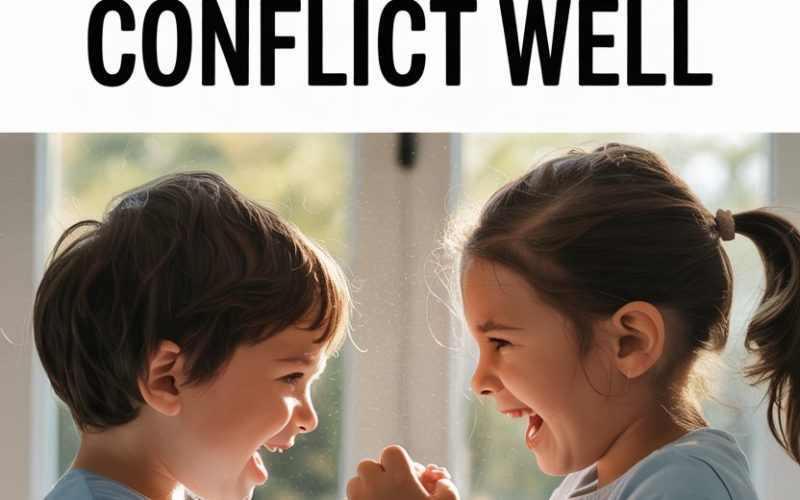Some days, just getting tiny humans out the door without a full-scale sibling skirmish feels like an Olympic event.
If you’ve ever watched your children argue over who gets the blue cup (when there are three identical ones in the cupboard), you’re not alone.
Teaching kids to deal with conflict isn’t about eliminating squabbles—it’s about helping them grow into adults who don’t run for the hills every time things get tense.
Why Conflict Isn’t the Villain
Conflict gets a bad rap, and sure, nobody loves refereeing a playground bicker-fest. Yet, psychologists like Dr. Laura Markham (from Aha! Parenting) remind us that friction is actually where social skills are forged.
Kids who never encounter a disagreement? They may struggle later when life isn’t as accommodating as their nan’s living room.
The trick isn’t to keep the peace at all costs. It’s to help children learn how to manage their feelings, listen to others, and solve problems—even when the solution is “take turns until the end of time.”
Modelling Conflict Resolution Like a (Mostly Calm) Pro
Here’s the cold, hard truth: Little ones learn most by watching, not by listening to our Oscar-worthy lectures about “using your words.”
If they catch us handling conflict by huffing, shouting, or giving the silent treatment (guilty as charged?), that’s what they’ll copy.
On the flip side, calmly explaining, “That upset me, but I’d like to talk about it,” teaches them more than any after-school special ever could.
And yes, admitting when we get it wrong (“Sorry I snapped, I was frustrated”) is a superpower.
Name the Feelings—Even the Weird Ones
Small kids aren’t born knowing that twisty feeling in their tummy is called “frustration” or that the urge to shout means they’re “angry.”
The more words they have for what they’re feeling, the less likely they are to act it out in a way that leaves you peeling spaghetti off the ceiling.
Start narrating out loud: “I see you’re upset your block tower fell down. That can be frustrating!” or “You look disappointed we’re leaving the park.”
Not only does this help defuse the moment, it gives them a toolkit for next time.
Side benefit: It might just encourage your partner to use their words, too.
Make Space for Listening (Even When You’re Busy)
Every parent has experienced the “Mum! But he’s not listening!” battle cry. Active listening is the Rolls Royce of social skills, and it starts in your living room.
When your child’s upset, pause, get down to their level, and repeat back what they’re saying: “You feel left out because your sister didn’t let you play.”
This sounds simple, but according to Harvard University’s Center on the Developing Child, it builds trust and calms brain chemistry, making problem-solving possible.
You might not have time for a TED Talk, but even a thirty-second “I hear you. That sounds tough” goes a long way.
Coach, Don’t Take Over
The urge to step in like a heavyweight referee and sort things now can be overwhelming (especially during that pre-dinner witching hour). But every time we fix things for our kids, we rob them of a chance to figure it out themselves.
Instead, try playing coach: “What do you think we should do?” or “How could you both get a turn?” Sometimes they’ll surprise you with creative solutions.
Sometimes they’ll stare at you like you’ve just suggested eating brussels sprouts for pudding. Either way, you’re building muscles that matter.
Foster Empathy With Small, Everyday Moments
Empathy isn’t reserved for grand gestures (“Let’s adopt a puppy!”). It’s built in tiny, unremarkable moments—like noticing when someone’s sad or asking how a friend’s day went.
Point out feelings in books, TV shows, or even among their own friends: “How do you think Sam felt when he didn’t get picked?” Encourage your child to consider others’ perspectives, even when they’re the one who feels wronged.
Research from The Greater Good Science Center shows that the more kids practice empathy, the better they become at resolving disputes.
Also, you’ll get to sound like the wise parent who “raises emotionally intelligent children.” Not too shabby.
Give Them the Words That Work (Scripts, Not Sermons)
Ever noticed how kids in books always seem to know exactly what to say? In real life, most children need a lot more practice. Short scripts can help: “I didn’t like that,” “Can I have a turn now?” or “Can we find a way to share?”
Practise these when things are calm, not in the heat of battle. (Trying to teach new skills mid-tantrum is like assembling IKEA furniture without the manual.)
Over time, these phrases become second nature, and you’ll hear your child calmly asserting themselves—maybe even with siblings.
Set Boundaries Without Shame
It’s easy to think being “kind” means putting up with anything. Actually, kids need to know it’s okay to say “no” and stand up for themselves—without being mean.
Setting boundaries is a skill, and it’s never too early to practice.
Encourage your child to express what they’re comfortable with: “I don’t want to play that game,” or “Please don’t grab my toy.” Back them up, even if it means a little social awkwardness on the playground.
Kids who learn to set healthy boundaries grow up better equipped to avoid toxic relationships and peer pressure—one less thing to lose sleep over.
Teachable Moments Beat Big Lectures Every Time
The car ride home after a meltdown might be the best time to talk about what happened. Ask gentle questions: “How did you feel when your friend said that?” or “What might you do next time?”
Keep it light—one heartfelt question will stick better than a marathon monologue.
No need to rehash every detail like a detective. The goal is to get them thinking, not regretting every life choice since breakfast.
Mentally Prepare for Imperfection
Here’s the truth: Even the most emotionally savvy kid will have days when they whack their sibling with a stuffed llama or dissolve into tears over a bent biscuit.
Conflict skills don’t show up overnight, and progress isn’t linear.
Keep your expectations realistic, and don’t be hard on yourself if your living room sometimes feels like a low-budget soap opera.
According to child development experts at Raising Children Network, messy moments are where real learning happens.
Tools for the Busy Parent’s Arsenal
Between school runs, work, and wondering why everyone needs a snack every thirteen minutes, who has time for complicated strategies? Try these “in-the-moment” tools:
- The Pause Button: When things get heated, take a breath and say, “Let’s all pause for a second.” This models self-regulation and buys everyone a moment.
- Visual Aids: Use a feelings chart or colour wheel on the fridge—helpful for younger kids or anyone who feels “all the feelings at once.”
- Conflict Jar: Write down ways to solve common spats (“take a break,” “rock-paper-scissors,” “trade toys”) and let kids pick an option.
- Role Play: Act out tricky scenarios using toys or stuffed animals. It’s easier to talk about “what Teddy could do” than what your big brother did.
- Digital Help: Apps like Smiling Mind offer guided meditations for kids and parents, making it easier to recalibrate after a blow-up.
Conflict Is a Skill, Not a Personality Trait
Some children are naturally more easygoing, while others could go ten rounds over a piece of string. Every temperament benefits from conflict-resolution coaching.
The loudest kid isn’t “bad at conflict,” and the quietest isn’t immune from needing support—sometimes, they just bottle it up until it explodes spectacularly (usually in public).
Check in with each child as an individual, and adjust your approach as needed. And if you ever worry your child’s struggles are bigger than what’s typical, reach out to your GP or a child development expert for tailored advice.
When Siblings Are the Main Event
If you’re parenting more than one, sibling strife quickly becomes your second career. The good news? Sibling squabbles are prime training grounds for real-world conflict management.
Every argument over who gets the last biscuit is a chance to learn patience, compromise, and forgiveness.
Resist the urge to appoint yourself permanent judge and jury. Guide them towards solutions, but let them try—and fail—a bit first. Siblings have long memories, but a well-timed apology (and a biscuit bribe) can work wonders.
From the Playground to the Pub—Why It Matters Down the Line
Raising kids who can handle conflict doesn’t just make home life less noisy. Research shows these skills pay dividends later, in friendships, classroom discussions, and even at work.
Conflict resolution predicts better mental health, stronger relationships, and fewer “my boss hates me” rants at the pub.
You’re not just raising kids who can share their toys. You’re helping them grow into adults who can handle tough conversations, ask for what they need, and walk away from drama when it’s the healthy choice.
The Gift That Keeps On Giving
Next time your kids are locked in an epic standoff over who touched whose pencil, take heart. Every skirmish is a chance for them to build skills they’ll use for life.
Your job isn’t to eliminate every spat—just to be there with a cool head, a few gentle words, and the occasional biscuit.
And who knows? Years from now, when they’re the ones calmly sorting out a disagreement at work or with their mates, you’ll look back and know you played a part.
Blue cup battles and all.




